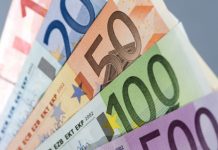- Pound (GBP) steadies after warning from BoE’s Catherine Mann
- GBP could fall lower says Mann
- Euro (EUR) rose after upbeat German factory orders
- German retail sales & Christine Lagarde in focus
The Pound Euro (GBP/EUR) exchange rate is rising after two days of losses. The pair fell -0.37% in the previous session, settling on Tuesday at €1.1212, after trading in a range between €1.1205 – €1.1293. At 05:45 UTC, GBP/EUR trades +0.12% at €1.1224.
The pound fell yesterday in risk-off trade, and asked the comments from Bank of England Catherine Mann Bank of England policymaker, said that the pound could fall further as investors digest hawkish messages coming from the Federal Reserve and the ECB.
The concern is that a falling pound feeds into rising prices and inflation, and it could result in the Bank of England needing to raise interest rates further.
There is no high-impacting UK economic data due to be released today, which means sentiment is likely to drive the pound.
The euro gained yesterday after German factory data unexpectedly rose in January, defying expectations of a 1% decline. Delving deeper into the data, the jump was owing to capital goods, particularly aircraft and spacecraft construction, as well as motor vehicle engineers.
Output in Germany shrunk 0.4% in the final quarter of last year, which means that a recession this quarter could be hard to avoid, particularly as rising interest rates have yet to filter through, impacting the system. That said, the manufacturing sector does have some grounds for optimism thanks in part improved energy situation and China’s reopening.
Looking ahead, German retail sales are expected to rebound in January rising 2% after fooling 5.3% in December. Retail sales had fallen as households were squeezed by high inflation and rising interest rates.
Attention will also be on ECB speakers, including President Christine Lagarde, with investors watching closely for clues over high-interest rates could rise. Last week Christine Lagarde had that rates may need to rise again after the March meeting, a message which has been reiterated several times by other ECB officials since.




